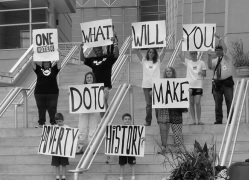 Organizing against poverty. Chicago, 2007. Organizing against poverty. Chicago, 2007. September 15th is the International Day of Democracy. If you didn’t know that, don't fret, I consider myself a democracy nerd and I didn't know. But, having spent the better part of my career working in new democracies, I thought it would be a good occasion to give credit to Chicago, the place that taught me about democracy. The more cynical among you are expecting jokes about voting “early and often”, political dynasties, or corruption in general. But that is not what I see as the roots of Chicago politics. Chicago politics boils down to three important tenants: politics is local, organizations are about people, and communication is key. This holds true at a community meeting about the local park or at a city council, and yes, it even holds true when politicians are using them to benefit the Machine Politics is local... and it’s about public services.
People care most about what is in front of them – schools, roads, security, public spaces, etc... I have worked with civil society and local government leaders in the Chicago, D.C., the Balkans, Afghanistan, and South Sudan. No matter where I am, after my first community meeting in a new place, I come out considering the same public services. Potholes, soccer fields, street lights, water systems, teacher salaries, local markets, vocational training, community centers –are some of the projects I have worked on over the years. But the root of each of these was helping citizens and governments work together to make their communities a better place. Chicago has a municipal structure where people know to go to their alderman and talk about these issues. A descent alderman will get his/her hands dirty removing graffiti and filling potholes. A great alderman will be a proactive community leader, represent the local needs of the ward to the city council, and promote the community to the rest of Chicago and the state. Don't get me wrong, Chicago could be improved. There are too many alderman who they have too much power (or not enough checks), but a system in which everyone knows who is their first stop if they want something fixed in their community, is a good system. Organizations - whether political, civic, ethic, or religious - are about people. Whether a human rights group, a refugee association, or a neighborhood council, organizations are about people - how they interact, what they need, and how get what they need. From Jane Adams and the suffrage movement to Jesse Jackson’s Rainbow PUSH coalition to Chicago's “political machine”, Chicago has a history of organizing people to make a difference. People working together to help each other and their communities. Because of Chicago’s deep history of organizing, great Chicago politicians always have people at the front of their mind. And if they forget, they are reminded. Great Chicago politicians are proactive in reaching out to neighborhood groups and gathering input before they make decisions. Whenever I begin working with a government official or civic group in a new democracy, getting them to put people, not egos, first is always the biggest struggle. The cynical among you can now make a crack that this also happens in Chicago (I know I laugh every time the Mayor welcomes me at O’Hare) but Chicagoans are good at organizing and reminding politicians where their priorities should be, which makes all the difference. Communication is not overrated. One of my favorite stories of a politician “not getting it” took place in Bulgaria. I was helping a local nonprofit to organize the first-ever parliamentary debate in their small town. The group toiled to find a nice space and develop polite questions, and just after the candidates were introduced, a cell phone rang. One of the candidates not only answered the phone, but then turned his back to have a 15-minute conversation. He was not elected. I generally feel that elected officials can never give the citizens with too much information. Transparency is vital to citizens holding their government accountable and without communication, there can be no transparency. “Please, let me know what you think about the stadium project so that I vote accordingly.” “I am sorry, I tried to work with the committee to get a better deal on the schools, but I got outvoted.” Newsletters, town hall meetings, Saturday office hours – there can never be too much communication. I learned this in Chicago too. Unfortunately we only have a few great, proactive, communicators in our city. Although I doubt that even the bad ones would take a cell phone call in front of a group of potential voters, Chicago politicians (and our state and federal representatives for that matter) need to get better at proactive communication. But even though communication can be better, our politicians know how to keep it local. They remember it’s about people – and when they don’t, the people remind them. All in all, these are all foundations for a great democracy, and all of this, I learned in Chicago.
0 Comments
Your comment will be posted after it is approved.
Leave a Reply. |
annisa's blogIncludes professional topics, as well as thoughts about politics. I also keep a blog on Medium that includes these, as well as more personal posts. archives
January 2020
categories
All
|

 RSS Feed
RSS Feed